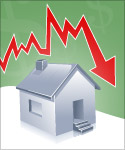
Is it time to buy a house or investment property?
It Depends…
If you need a place to live and want to own a house, why not? Prices in some areas are fairly reasonable. But if you're speculating, our guess is that you'll get a better deal if you wait.
Why? House prices may be firming in some areas – that's what the Case-Shiller numbers seem to show. But nationwide, they are probably headed down for quite a while longer.
Here are four reasons why:
First, as you know, this is a depression. It will probably be long. And deep. You wouldn't know it from looking at the stock market or reading the news. The Dow went up another 114 points yesterday. Oil rose to $71. And the dollar – anticipating inflation – fell to $1.44 per euro.
But that's what bounces are supposed to look like. They look good enough so that people mistake them for the real thing… and get suckered into more losses.
This is a depression. Depressions drag down asset prices. Typically, prices become much more reasonable. And then they reach UNREASONABLE levels. House prices have become reasonable. Now they will become unreasonably cheap…
 Real estate has been regarded as one of the safest investments for quite some time. However, despite the relative safety of
Real estate has been regarded as one of the safest investments for quite some time. However, despite the relative safety of  In some of the worst housing markets in the country, deflation has reached double-digit proportions. While housing woes have spread around the country, California appears to be poised to rank among the worse. One of the primary reasons for this is the fact that in the last few quarters California has experienced the largest rate of deflating home prices. In fact, home prices in California have fallen to levels that have been unprecedented.
In some of the worst housing markets in the country, deflation has reached double-digit proportions. While housing woes have spread around the country, California appears to be poised to rank among the worse. One of the primary reasons for this is the fact that in the last few quarters California has experienced the largest rate of deflating home prices. In fact, home prices in California have fallen to levels that have been unprecedented.
